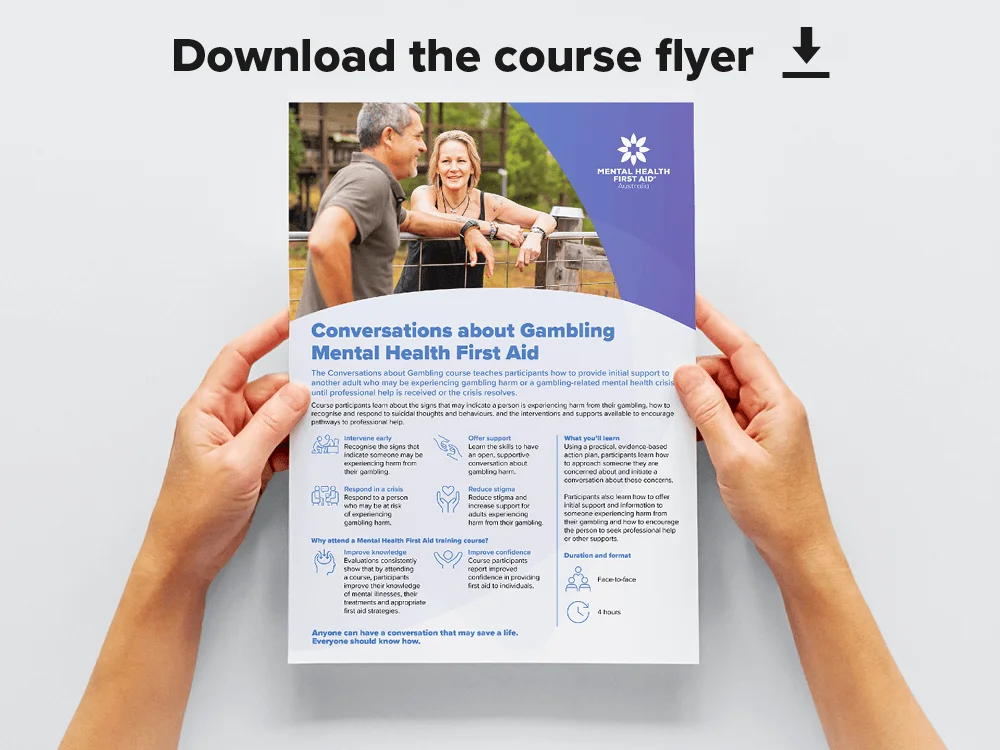Conversations about Gambling
Equips adults with the knowledge, skills and confidence to recognise, understand and respond to a friend, family member, co-worker or other person, experiencing harm or a mental health crisis related to their gambling.

INTERVENE EARLY
Recognise the signs that indicate someone may be experiencing harm from their gambling.

OFFER SUPPORT
Learn the skills to have an open, supportive conversation about gambling harm.

RESPOND IN A CRISIS
Respond to a person who may be at risk of experiencing gambling harm.

REDUCE STIGMA
Reduce stigma and increase support for adults experiencing harm from their gambling.
The Conversations About Gambling course teaches participants how to provide initial support to someone who may be experiencing gambling harm or a gambling-related mental health crisis, until professional help is received or the crisis resolves.
Course participants learn about the signs that may indicate a person is experiencing harm from their gambling, how to recognise and respond to suicidal thoughts and behaviours, and the interventions and supports available to encourage pathways to professional help.
Using a practical, evidence-based action plan, participants learn how to approach someone they are concerned about and initiate a conversation about those concerns. Participants also learn how to offer initial support and information and how to encourage the person to seek professional help or other supports.
Watch this short video to learn more about our course.
Course information

Delivery format
Face-to-Face

Duration
4 hours
Take the next step
For individuals or small groups
For larger groups
Free training in NSW
Mental Health First Aid International has partnered with the Office of Responsible Gambling NSW to deliver free Conversations about Gambling courses.
Why MHFA?
Evidence-based: All Mental Health First Aid courses are based on guidelines that are informed by people with lived experience, their caregivers, and mental health professionals.
Rigorously evaluated: Evaluations consistently show that Mental Health First Aid training improves participants’ knowledge of mental illnesses and their treatments, and confidence in providing mental health first aid to individuals.
Skills-based: Teaches the practical skills, knowledge, and confidence to make a difference.
Internationally recognised: Over 6 million people trained in Mental Health First Aid across 25 countries.
Learning Outcomes
Upon completion of this course participants will be able to:
- Recognise the signs that indicate someone may be experiencing harm from their gambling
- Understand the prevalence of gambling problems in Australia
- Understand the continuum of gambling and the risk factors associated with harmful gambling
- Understand the motivations for gambling and the relationship between harmful gambling and mental health problems
- Use an evidence-based action plan to initiate a mental health first aid conversation
- Know how to recognise signs of and provide initial support to someone who may be at risk of suicide
- Know the barriers to help seeking and how to overcome these
- Understand risk factors and treatments and supports available for people experiencing harm from their gambling
- Understand relapse in the context of harmful gambling
- Apply self-care practices as a Mental Health First Aider.
Suitability
Suitable for individuals, workplaces of all sizes and volunteer and community-based groups.
Any adult (aged 18+) can attend.
Course Content
Participants in this course will learn how to apply mental health first aid to a person experiencing harm from their gambling.
Duration & Format
This half-day course is delivered face to face by an MHFA trained and Licensed Instructor.
Accreditation
There is no accreditation for this course.
Course Fees
Mental Health First Aid Australia does not employ the Instructors that it trains and licenses. Therefore, each Licensed MHFA Instructor has the autonomy and flexibility to set their own course fees. Course fees do vary for many reasons which can include course type, individual Instructor qualifications and credentials, course venue, course location (metropolitan vs regional locations), course catering and any course participant subsidies that may be available as a result of a community grant.



